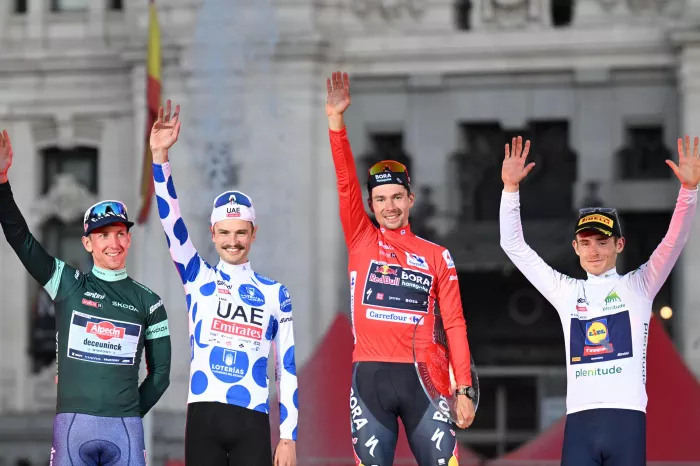Primoz Roglic, fresh off his fourth victory at the Vuelta a España, recently discussed the pivotal moments of his cycling career in an interview with Kristjan Vreček, a former Slovenian mountain biker. This win comes on the heels of a challenging period during his debut season with Red Bull-BORA-hansgrohe and follows a streak of misfortune at the Tour de France.
At 34, Roglic’s journey to cycling stardom began far from the bike. He excelled in ski jumping during his youth, winning the world junior title in 2007 as part of the Slovenian team. However, a severe crash in 2011 shifted his focus to cycling as he rehabilitated. He officially began his cycling career in 2013 with Adria Mobil, a Slovenian Continental team. “I didn’t want to get paid there,” Roglic recalled. “I didn’t even dream of racing, and I didn’t know anyone in cycling. I only watched races on TV and thought it was something I could do.”
Despite his initial intentions, Roglic received a salary of 300 euros for his efforts. After three years at Adria Mobil, he joined LottoNL-Jumbo in 2016, an opportunity he embraced without hesitation. “If you don’t know what to expect and don’t care, you just do it,” he explained, emphasizing his willingness to tackle whatever challenges lay ahead.
The 2016 Giro d’Italia marked a significant turning point for Roglic. Competing for LottoNL-Jumbo, he finished second in the prologue in Apeldoorn, just behind Tom Dumoulin. “At that moment, I realized I could also ride a time trial and felt that maybe I could do more than that,” Roglic said. His confidence soared after winning stage nine—a time trial—just nine days later, solidifying his belief in his potential.
For many cyclists, a last-day defeat at the Tour de France could be a devastating blow, but Roglic views it differently. In the 2020 Tour, he led after 19 stages, only to be overtaken by compatriot Tadej Pogacar in the final time trial at Planche des Belles Filles. Despite the disappointment, Roglic remained grounded. “I didn’t even think about changing anything because I don’t have any bad feelings about it,” he reflected. “It was the best I could get, and that’s okay.”
As he continues to navigate the highs and lows of professional cycling, Roglic’s resilience and perspective on his journey stand as a testament to his character and dedication to the sport.
Related topics:
- RFU Faces Crisis as Schools Rugby Declines, Warns Review
- French Transport Minister to Meet Cycling Groups After Cyclist’s Death Provokes Protests
- Facing Mortality: Chris Hoy’s Perspective on Terminal Illness

